The Naked Gun’s Most Iconic Moments, Told By The Comedy Geniuses Who Made It
This article first appeared into the September 2018 issue of Empire. —...
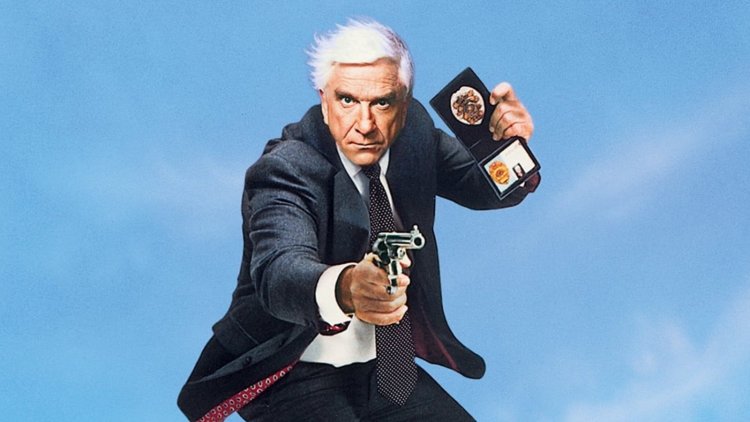
This article first appeared into the September 2018 issue of Empire.
---
Thirty years after unleashing defective detective Frank Drebin onto the streets of LA, the men behind The Naked Gun talk us through its most iconic moments.
“I’ve finally found someone I can love. A good clean love, without utensils.”
So spoke Lieutenant Frank Drebin in the closing moments of The Naked Gun, romancing his girlfriend mere seconds after his would-be assassin is trampled to death by a marching band. It’s been 30 years since Leslie Nielsen’s Drebin crashed into cinemas, getting everything wrong yet somehow still solving the case. Today, Drebin’s co-creators David Zucker, Jim Abrahams and Jerry Zucker (aka ZAZ), brought together by Empire for an anniversary chinwag, are in fine fettle — there’s no mistaking Drebin’s heritage. “Tell me if I’m wrong,” says Empire, about to pose a question. “You’re wrong!” shouts David Zucker. And so it goes.
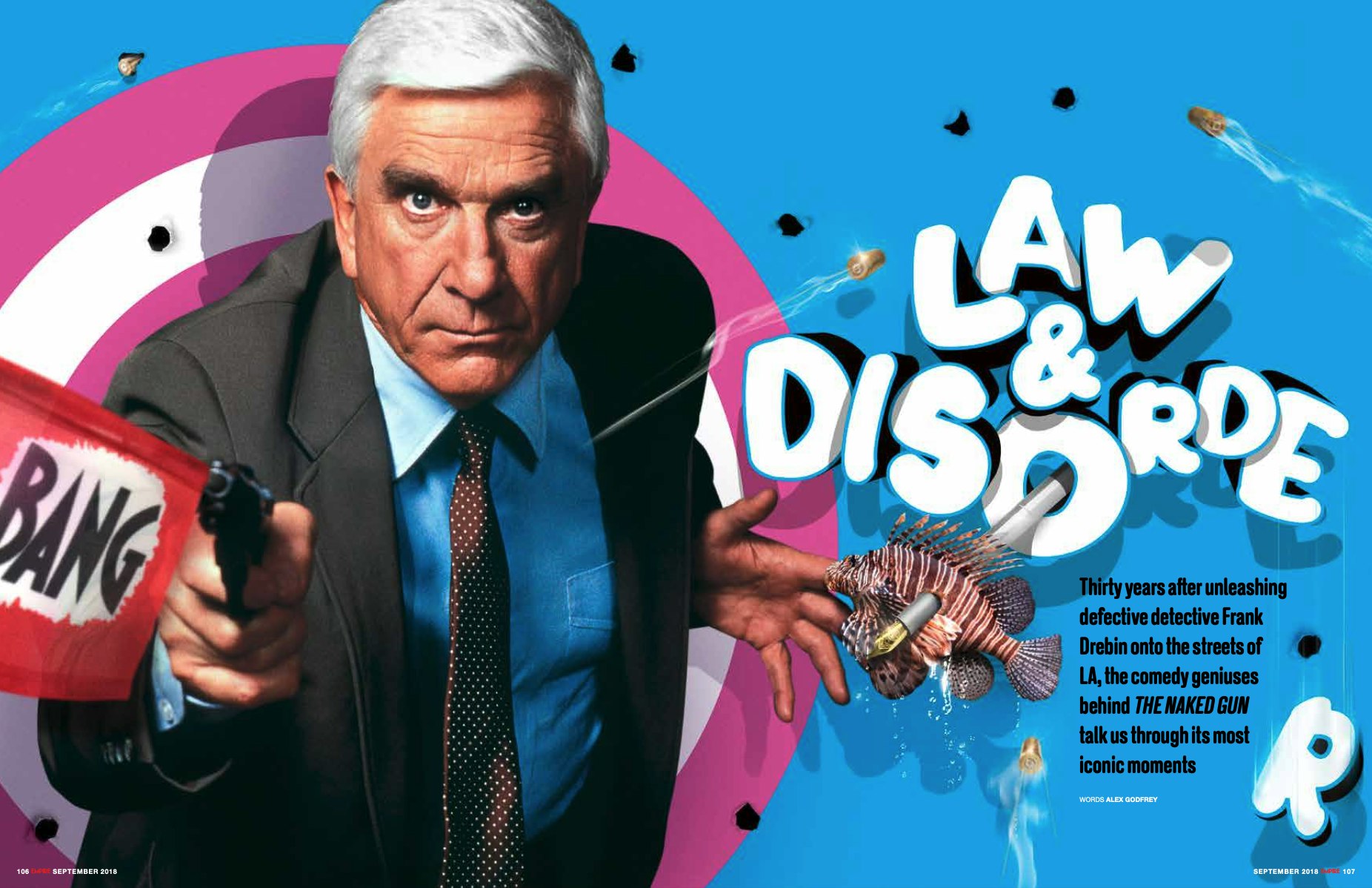
As students at the University of Wisconsin in 1971, ZAZ created a live show, Kentucky Fried Theater, an endless onslaught of skits. “None of us by training is in any way an actor,” says Abrahams now. “We didn’t feel comfortable on stage to begin with, so if a joke would bomb, we would get rid of it. We were only comfortable when the laughs kept flowing.” This wildly successful joke-after-joke-after joke formula hit big with 1980’s Airplane!, which took the plot from 1957 drama Zero Hour! and turned it on its head, ZAZ sticking straight, dramatic actors, including Nielsen (as Dr ‘Don’t call me Shirley’ Rumack), into absurd, quickfire situations.
They then cast Nielsen as Frank in 1982 TV series Police Squad!, a spoof of late-1950s Lee Marvin police procedural M Squad, eventually expanding it to feature-length for 1988’s The Naked Gun, in which Drebin foils a plot by dastardly businessman Vincent Ludwig (Ricardo Montalban) to assassinate The Queen. Three decades on, it is as wonderfully ridiculous as it ever was. With ZAZ together, Empire picked ten of the film’s greatest hits, sat back and enjoyed the show.
Drebin And The Dictators
The film opens with Idi Amin chairing a meeting in Beirut, plotting against America alongside a menagerie of dastardly dictators. their waiter is then revealed as our hero, who pummels them all before announcing at the window: “I’m Lieutenant Frank Drebin, police squad. And don’t ever let me catch you guys in America!” The Louvre doors then slap him in the face.
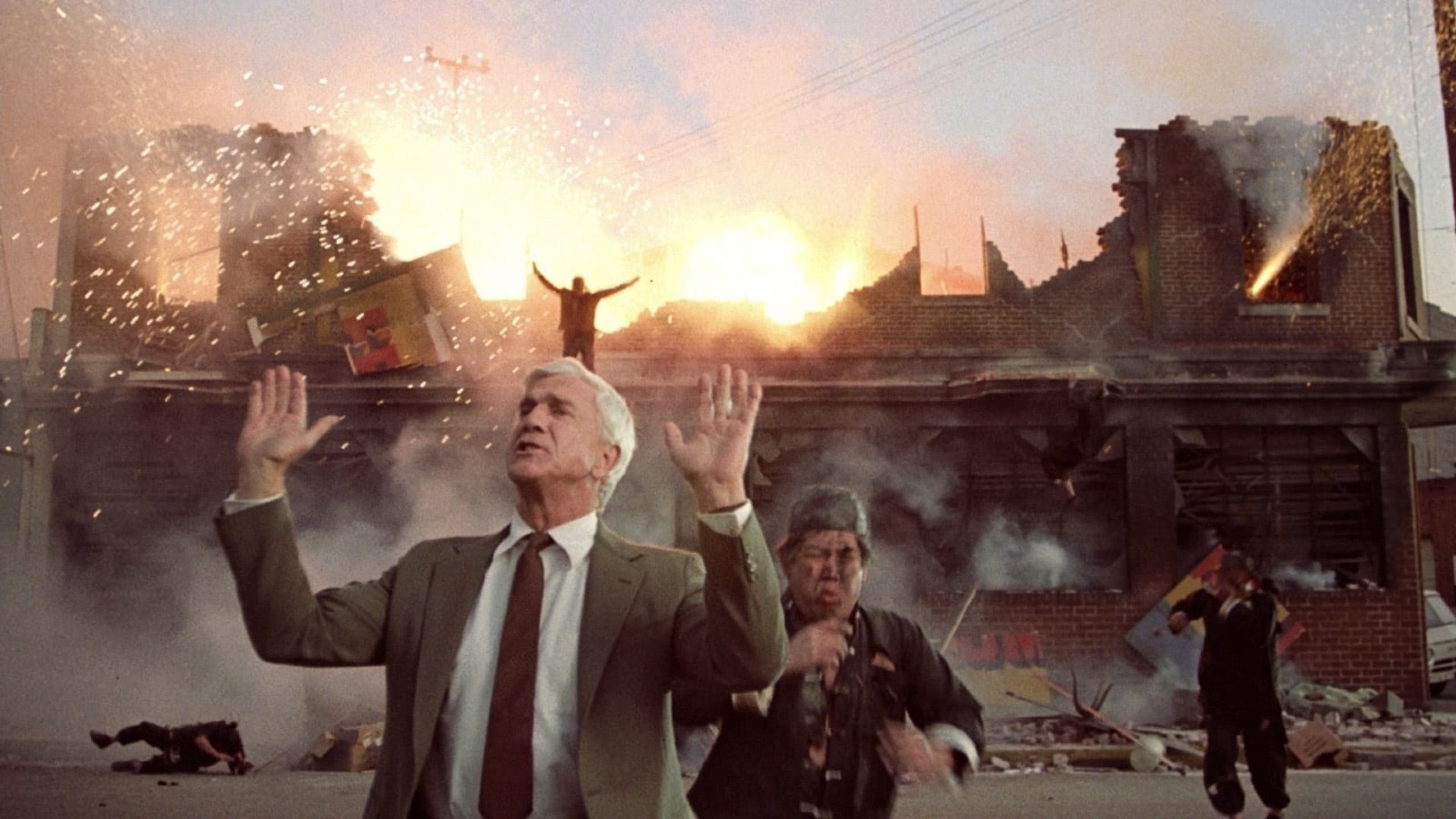
Jerry Zucker: At some point someone said, “Why don’t we get every evil dictator in one room and have him dispatch them off?” And that seemed like a funny idea.
David Zucker: We had to introduce Leslie. We needed to make a big splash.
Jim Abrahams: HBO just did some movie about those times and they had an actor portraying Gorbachev and they didn’t have the birthmark on his forehead. Why wouldn’t you do that?
Jerry Zucker: Maybe it was one of those hidden things: “Can you find what’s wrong with the actor playing Gorbachev’s head?”
Abrahams: It wasn’t an issue with us, was it?
David Zucker: We would have done it anyway, but we also wrote that joke later about wiping it off.
Abrahams: It turns out his birthmark was a good thing for us.
Siren Call
The film’s iconic opening-credits sequence features Frank’s cop car roaming the city, camera mounted just behind the wailing siren. It hits the pavement, to the horror of scrambling pedestrians, then goes through a car wash, into a house, a girls’ locker room and along a rollercoaster.
David Zucker: That came from M Squad — that’s the exact way it started, the [siren] going through the city. And we just sat around thinking what could happen, where it could go. So it became the roller coaster, and the girls in the shower, because we were younger and we wanted to cast naked women. And the other gags just kind of came into play.
Abrahams: That’s typical of the way we wrote. We would say, “Here’s a straight situation... now how many things can we do to be goofy?”
Jerry Zucker: We wanted to call the film Police Squad, but Paramount said it was too close to Police Academy. And they were right. They have title thinker-uppers — that’s actually a job — and they gave us a list of 100 titles. They were pretty dreadful, but The Naked Gun made us laugh. We all thought that was alright.
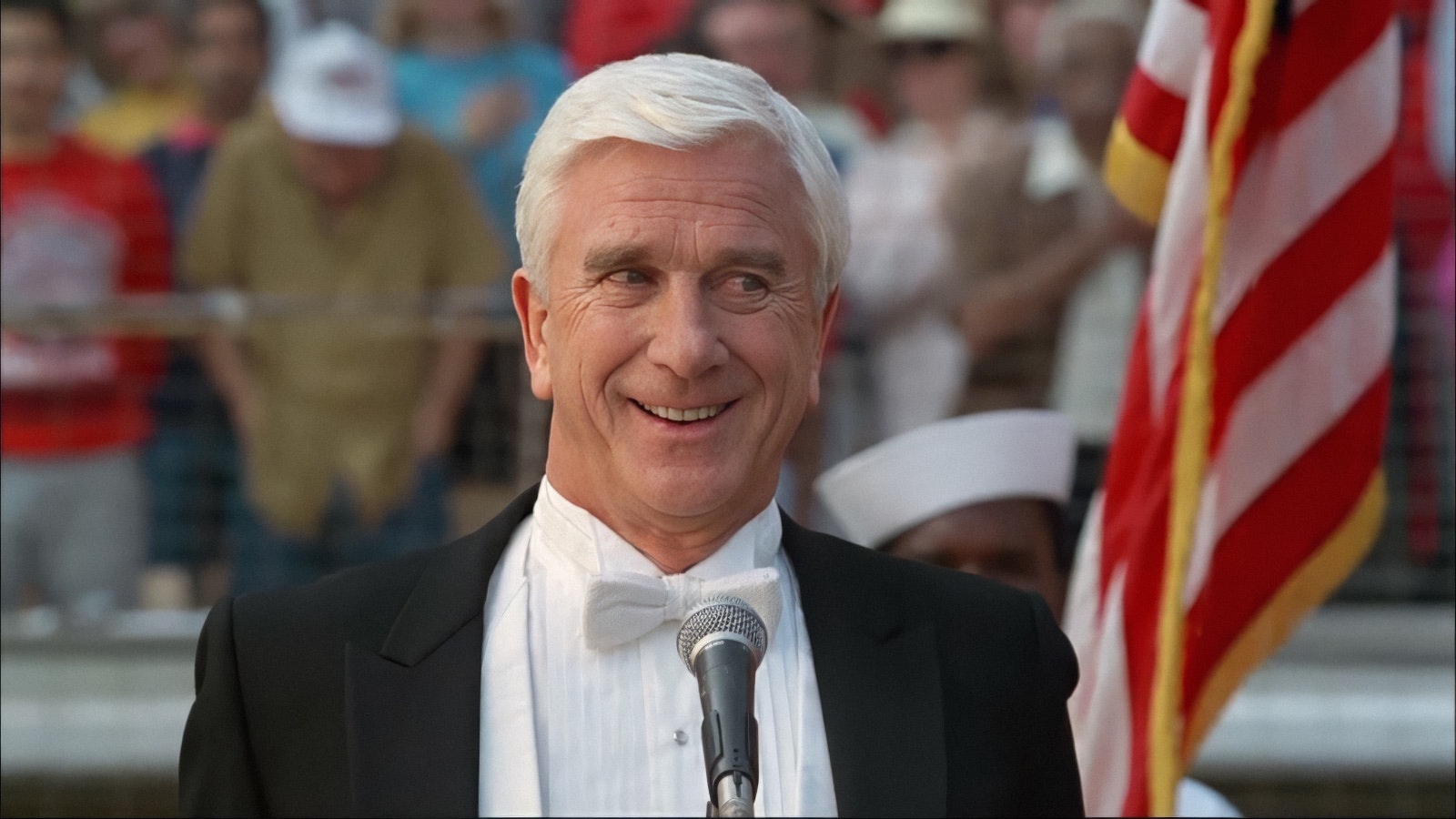
Nordberg’s Bad Luck
At the port of Los Angeles, Nordberg (O.J. Simpson) listens in on a heroin deal. He kicks through a boat door and a gang shoot him, precipitating a slapstick obstacle course before he finally falls into the water.
David Zucker: O.J. got better with every movie. He improved as an actor. But that was before he murdered people. So we try to compartmentalise the whole thing. Is that how you remembered it, Jim?
Abrahams: You know... um... I’m just sorry I sold the autographed football he gave me.
Jerry Zucker: We watch lots of old movies when we’re writing. And in a lot of movies when someone gets injured or shot or whatever, they hang on longer than they would. So it was based on that idea.
David Zucker: It happened in The Godfather. It looked like they shot Brando eight times. And he still survived.
Jerry Zucker: Yeah. So it was the idea of that. And then it just became one indignity after another.
Abrahams: We said, “Then he can have his hand caught in the window and fall into a birthday cake and get paint on him and burn his hand on a stove.”
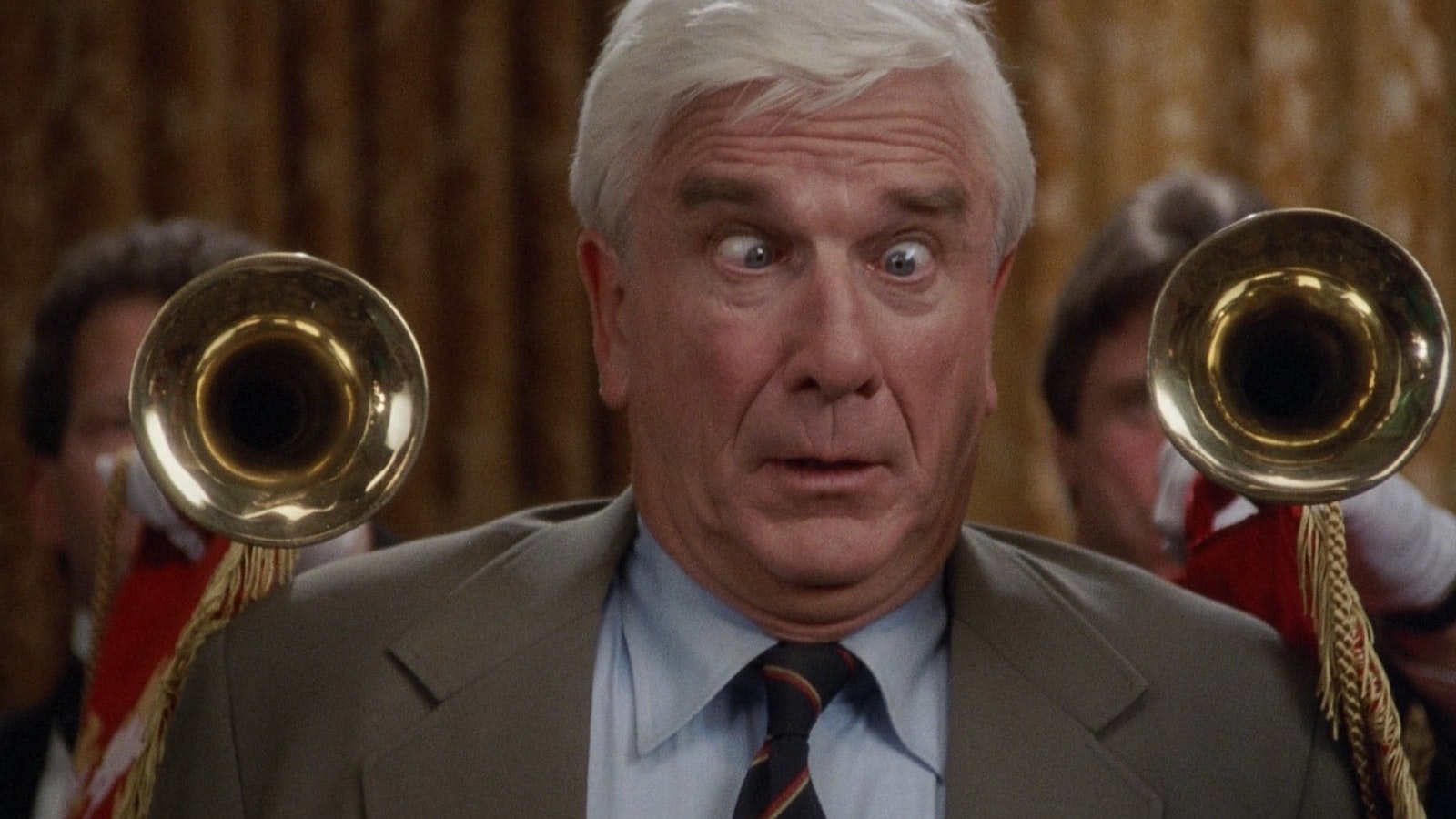
Toilet Trouble
During a press conference, Frank goes to the toilet, unaware that he is still mic’d up. His subsequent toilet release and accompanying groans of relief are broadcast to the crowd.
David Zucker: That actually happened in our synagogue back in Milwaukee — halfway through the service the rabbi went to the bathroom and it came through the PA system. But that’s not where we got the idea— that happened afterwards.
Abrahams: The rabbi was copying the movie?
David Zucker: Well, it’s called life imitates art, I guess.
Jerry Zucker: This sort of thing, it was from our arrested development, our 13-year-old minds. Later in the film when he grabs the naked statues... we’ve all seen naked statues, and it just seemed, “Okay, he’s out of the window, what does he grab hold of ?” A lot of times it was all of us sitting in a room drinking coffee, going, “How about this? How about that? No, wait, that, but do it this way. No, no, do it this way but then he’ll do this.” One thing builds after another.
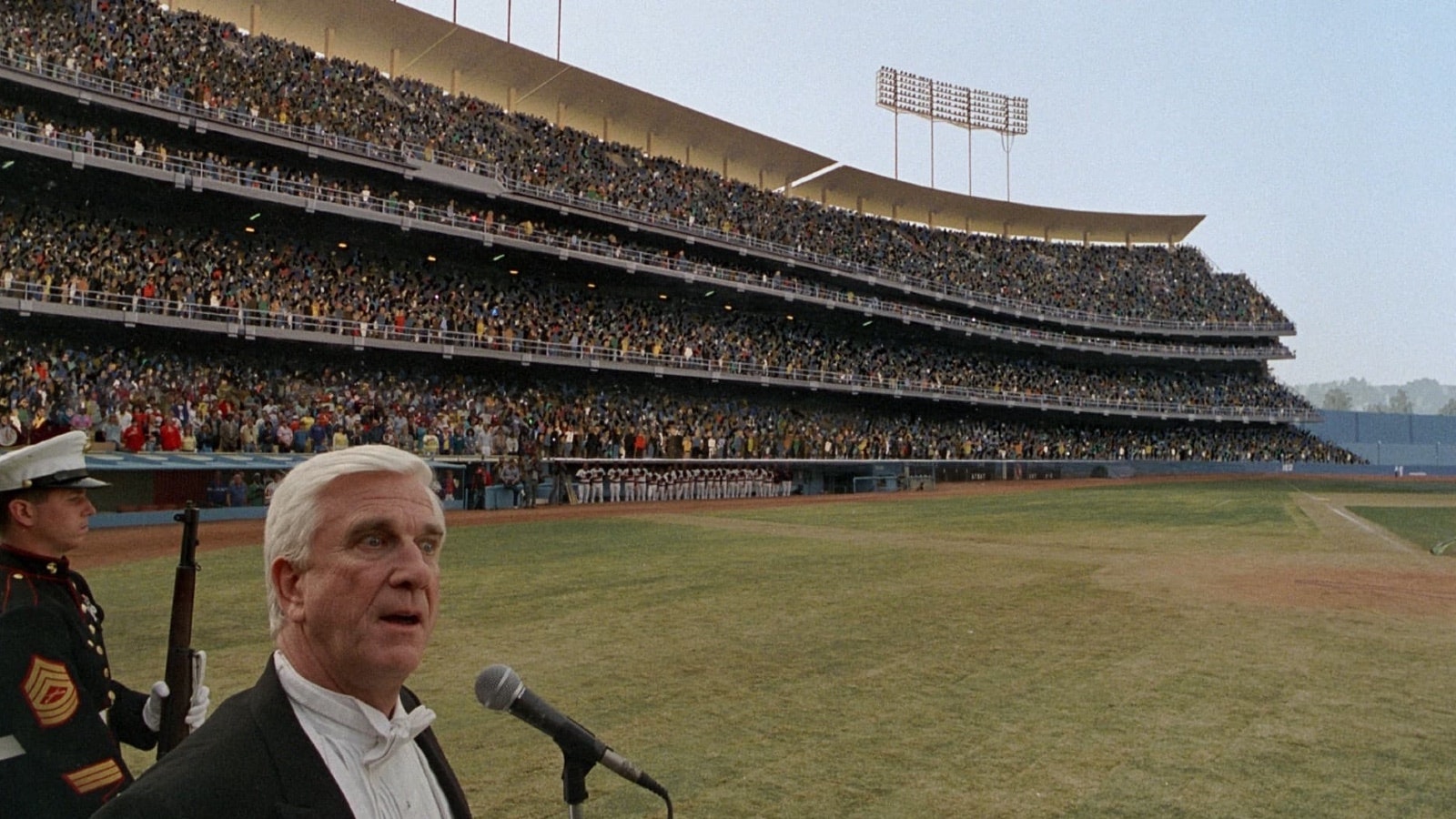
Nice Beaver
Frank meets Vincent Ludwig’s assistant Jane Spencer (Priscilla Presley), who sashays down a staircase, then falls over and walks into a wall. Fetching Frank some documents, she climbs a ladder as he peers up from below. “Nice beaver,” he says — as she hands him a taxidermied, semi-aquatic rodent.
David Zucker: That was from Farewell, My Lovely with Robert Mitchum. That scene, where Priscilla appears at the top of the stairs, in the original it was Charlotte Rampling and Robert Mitchum narrated how she came down the stairs. So we figured she could fall down the stairs. And maybe that included a scene where she went up a ladder to get some things.
Jerry Zucker: I don’t remember that. But we did at the time have a secretary that didn’t wear underwear. [Laughs] That might have been it.
David Zucker: We had many inspirations.
Abrahams: That joke, it’s a great laugh and everything, but Priscilla’s reply — she says, “Thanks, I just had it stuffed” — that always makes me laugh too.
David Zucker: I remember that line because no-one ever heard it in the theatre. People were laughing so hard at, “Nice beaver.”
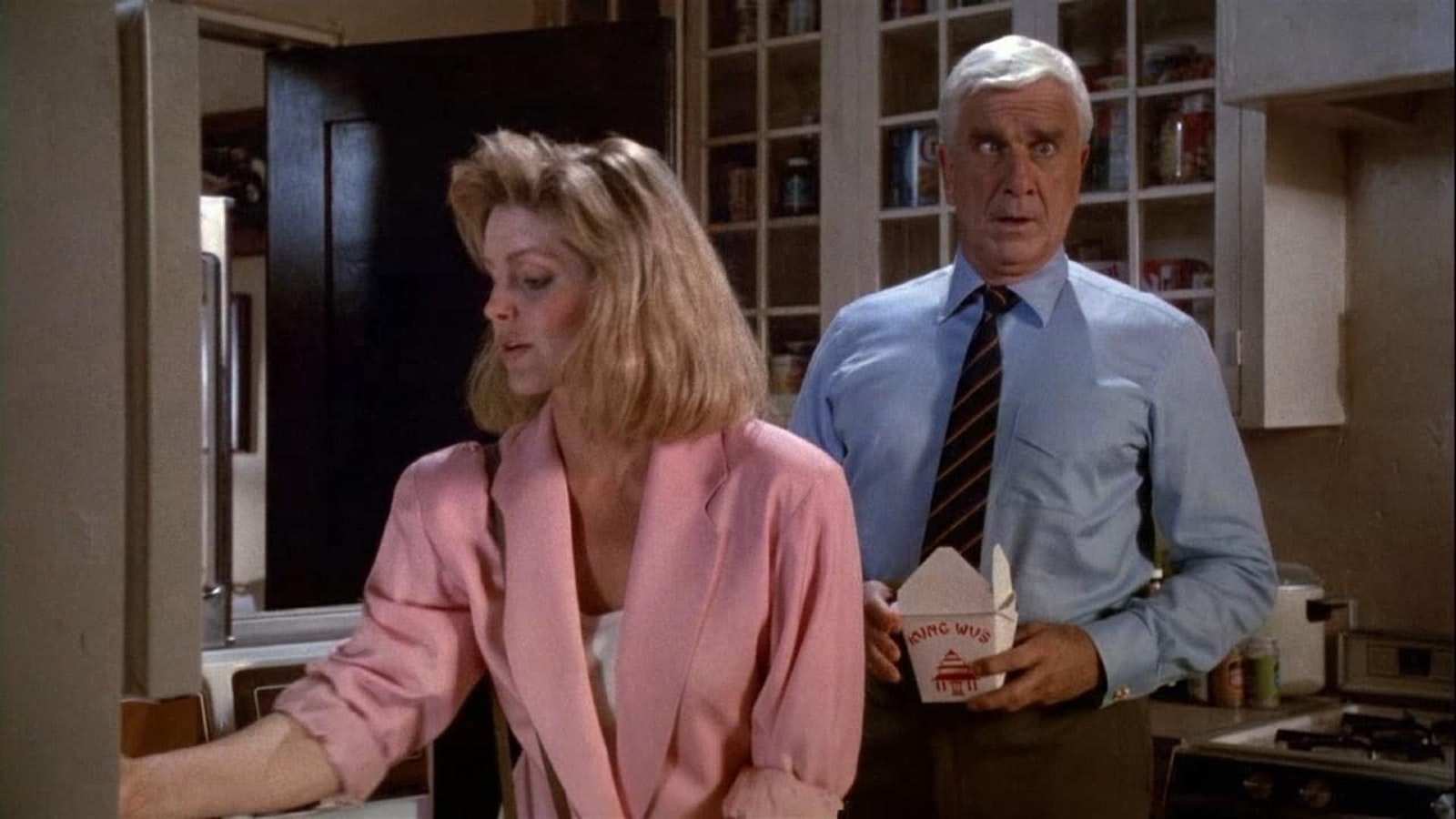
Going Downhill
Returning to the police station, Frank crashes his car into some dustbins. He leaves the car, oblivious, as the handbrake is dislodged and the car rolls downhill towards him. He shoots at it and it explodes, before crashing into a fire hydrant. “Anybody get a look at the driver?” he quizzes onlookers.
David Zucker: I like that because it’s one of those things where we allow the audience to kind of meet us halfway. The audience comes to understand what Leslie is thinking. In Naked Gun 2 1⁄2 he says, “Give me the strongest thing you’ve got,” and the waiter brings in a muscled guy, and then he says, “No, give me a Black Russian,” and the waiter just looks into the camera and shakes his head, like, “Whatever you were thinking, we’re not gonna do that joke.” Those are some of my favourite things.
Jerry Zucker: We’d seen Leslie in thousands of shows before we cast him in Airplane!. His name to our generation was not that widely known, but he was still an icon — once you looked at his picture you’d say, “Oh, that guy.”
David Zucker: Nobody knew the name Leslie Nielsen; he was that guy who was in The Poseidon Adventure, or whatever B movies he was in.
Jerry Zucker: I think that’s what I just said.
David Zucker: I wanted to say it not quite as goofy.
Jerry Zucker: You said it better, yeah.
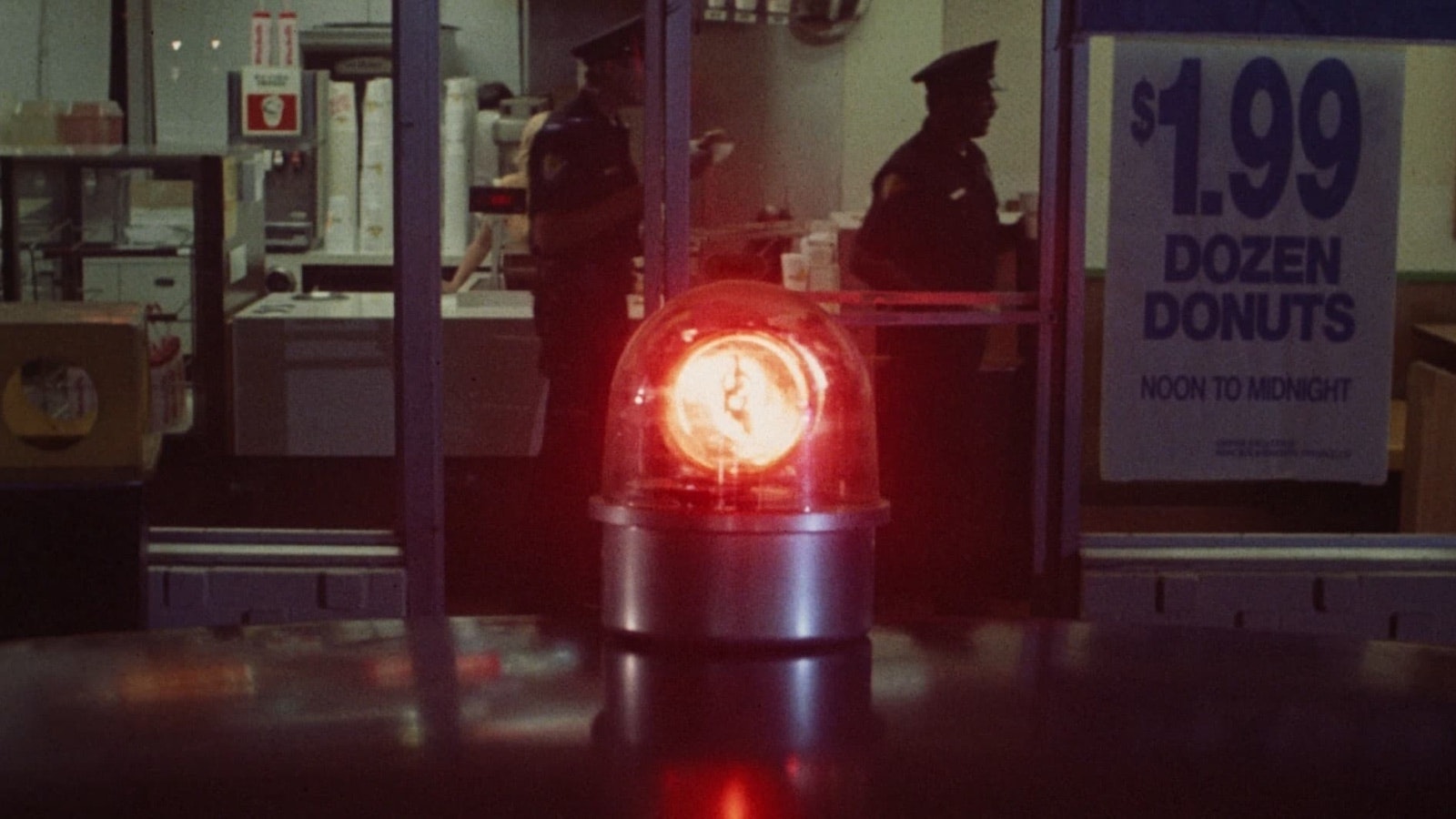
Teen Driving School
Pursuing an assailant, Frank jumps into a car and asks the driver to follow the vehicle in front — but finds himself in the midst of a driving lesson with a droll instructor, played by Oscar-winning dramatic actor John Houseman. “Nothing to see here,” Frank tells the crowd as the hitman’s car then collides with and explodes a fireworks factory.
David Zucker: John Houseman was very comfortable doing it. What we wanted was John Houseman. It was just another bit of casting judo, where he was not known for this kind of comedy at all, but like Leslie...
Jerry Zucker: ...was just able to do it so well. Actually that woman who plays the driver [Winifred Freedman] is terrific, I thought.
David Zucker: She was appropriately nerdy.
Jerry Zucker: She looks like she might be a comedian but she was not. She feels kind of innocent. Which is actually what a lot of it is about: playing innocent, not letting on that you know you’re in a comedy. As for Frank’s line, “Nothing to see here” — I have seen the expression used a lot since, in memes but also when people are writing about politics or whatever, and I never can quite believe it; is that really from The Naked Gun?
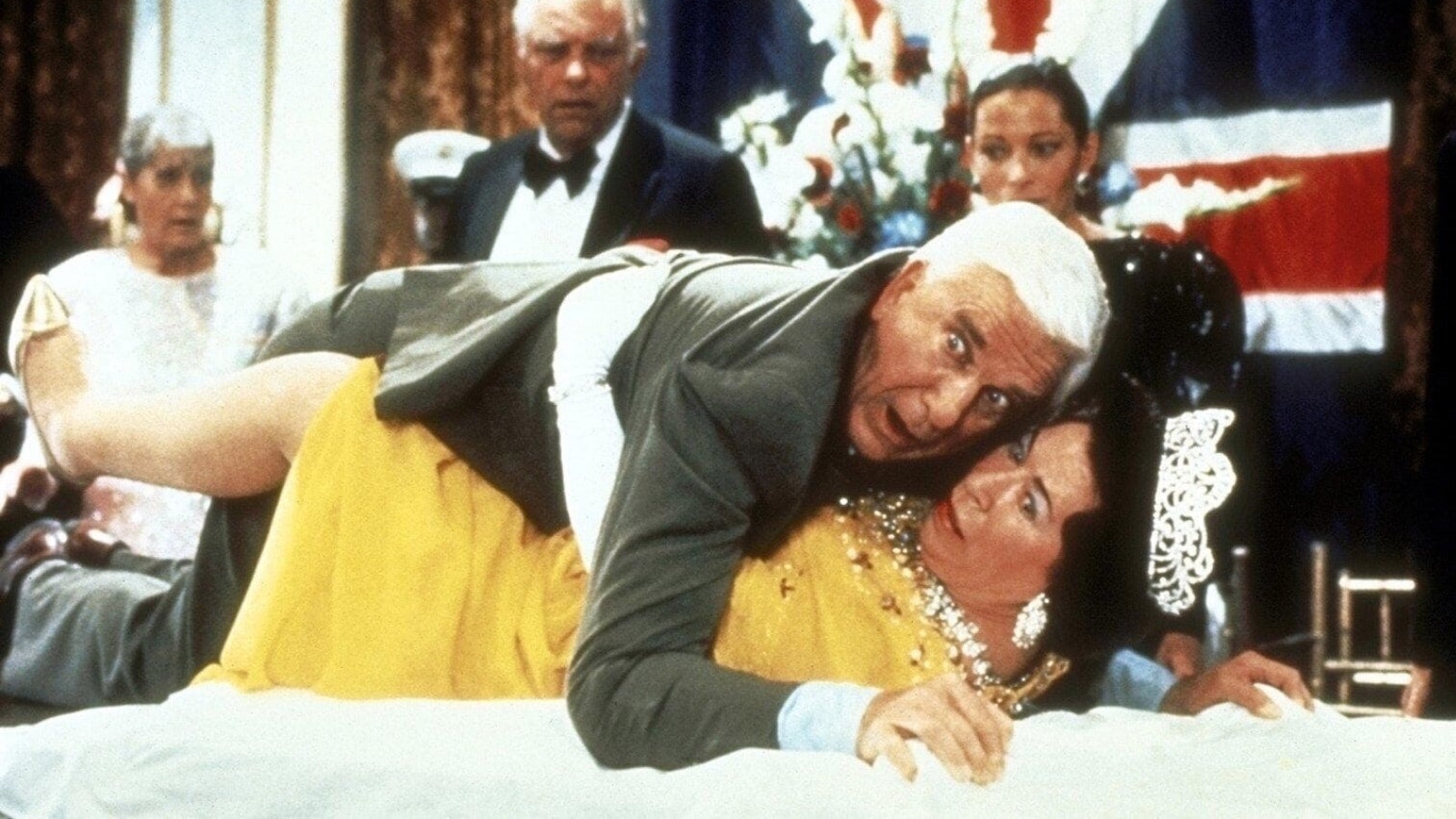
Very Safe Sex
Arriving back at his apartment one evening, Frank is surprised to find Jane, in full seduction mode. “I want you to know — I practise safe sex,” she tells him. “So do I,” he says, and they both reappear wearing human-sized prophylactics.
David Zucker: I don’t remember how we came up with that, but I do remember thinking, “I don’t know why we used the actual actors, because we could have used stunt people.” Because Priscilla was really claustrophobic about it. But she was a trouper, and did it. And it was just so needless. It was genuinely hard for her. Leslie enjoyed being in a giant condom.
Jerry Zucker: He actually had his own that he brought.
Ludwig’s Last Stand
Frank stuns Ludwig with a dart. The villain then topples off the roof and hurtles to the ground, where he is run over bya lorry, a steamroller and a marching band.
David Zucker: Ricardo Montalban was very good, he loved doing the film. I had a good time doing it with him. He played a scene with our mom — she played his secretary.
Jerry Zucker: For the ending, a lot of times in movies we think villains are killed, but then they get up. You wanna kill your villain in a satisfying way. They always try to in action movies, so we just did the ridiculous version of it.
David Zucker: And we were probably thinking that just a death isn’t necessarily funny. It was funny that Leslie hit him with that dart and said, “It isn’t fatal”, and then he falls off and is killed. And then we just kept doubling down on it to make the death of the villain funny rather than, “Ewww.” That would be spelled E-W-W-W.
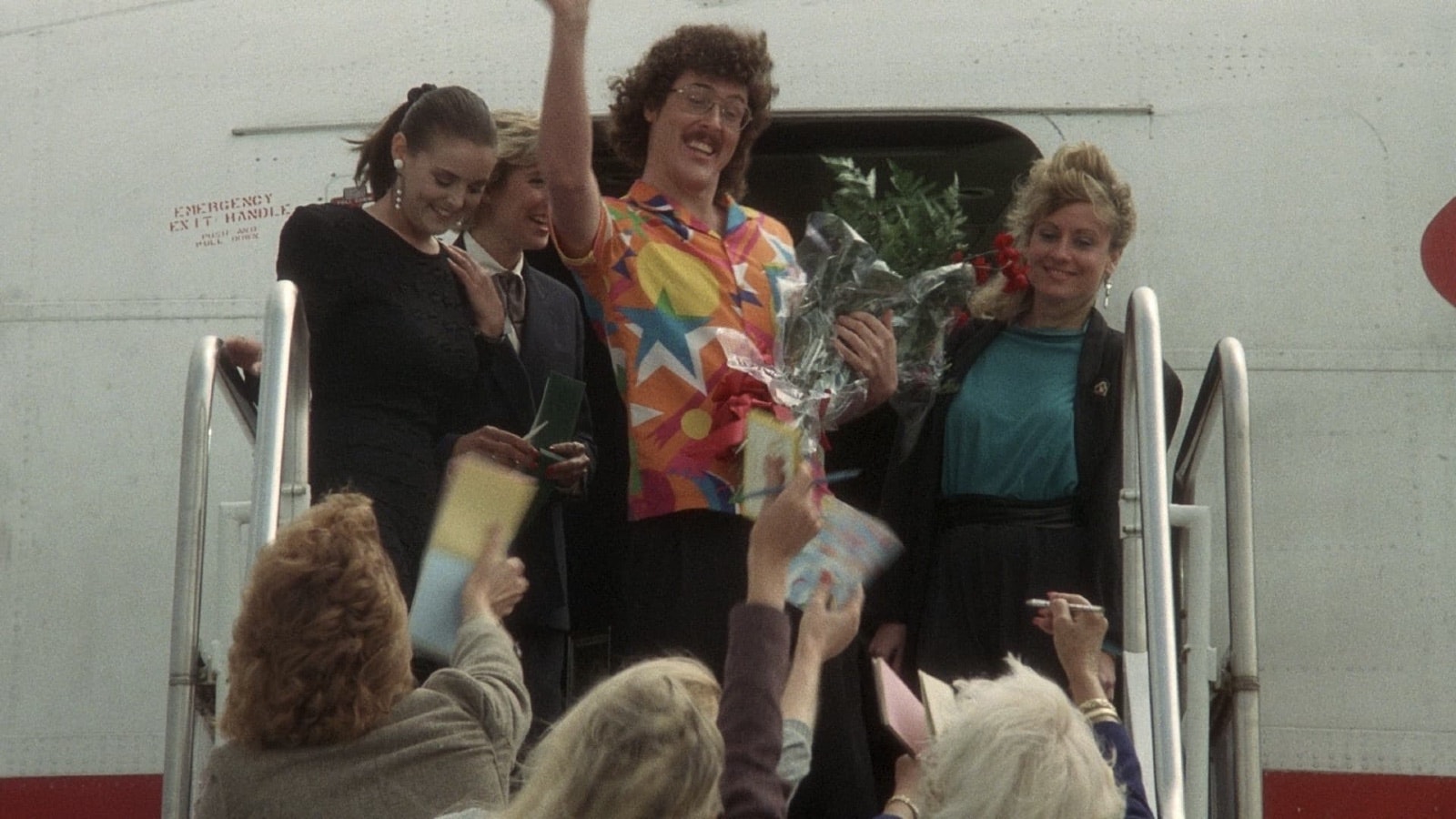
The Flying Nordberg
With the villain dispatched, Nordberg arrives in a wheelchair. Frank gives a hearty slap to the back of his chair, and Nordberg rolls down several steps before being sprung onto the baseball pitch below. A musical sequence was filmed, to follow Nordberg’s unplanned pitch invasion, but was cut.
David Zucker: There was some kind of thing we were going to do during the end credits. They were walking down the field and we had fans in the stand and everyone was singing ‘Take Me Out To The Ballgame’. But the gag with O.J. going over the rail got such a huge laugh, it was obviously the end of the picture. You live and learn. Someone thought we needed a little thing at the end, but that’s why we go through a preview process — the audience tells us when the ending happens.
Abrahams: Part of why the film holds up is because it’s a good story with a good ending, as well as funny jokes. It really took eight years for us to learn the moral of Airplane!, which is you need a complete story with a character arc where boy meets girl, loses girl, gets girl back... All the nuts and bolts of storytelling are really reflected in Naked Gun. We spent as much time working on the story as we did on the jokes.
Jerry Zucker: So little of it is typical — it’s a satire on movie and TV conventions.
David Zucker: The last time I saw the film was at Sketchfest in San Francisco, five years ago. In front of an audience it’s amazing: it still works. People really laugh. That’s the nice thing about it.
What's Your Reaction?























